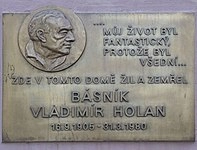How to Pronounce Vladimír Holan
#50
Most Popular
Boost
Sep 16, 1905 Prague, Czech Republic Died on 31 Mar 1980 (aged 74)
Czech poet and translator
VirgoVladimír Holan, Date of Birth, Place of Birth, Family, Facts, Age, Net Worth, Biography and More in FamedBorn.com

Czech poet and translator
Virgo